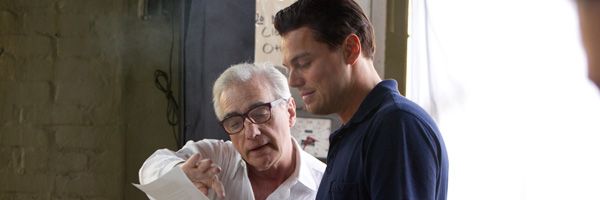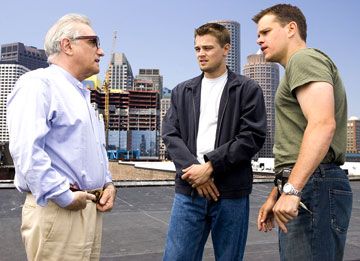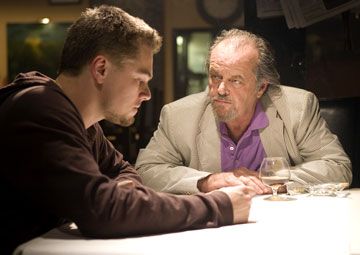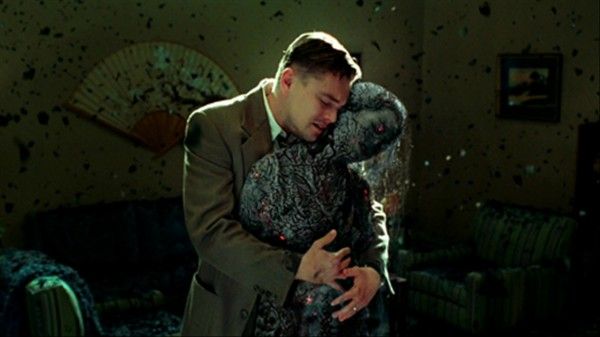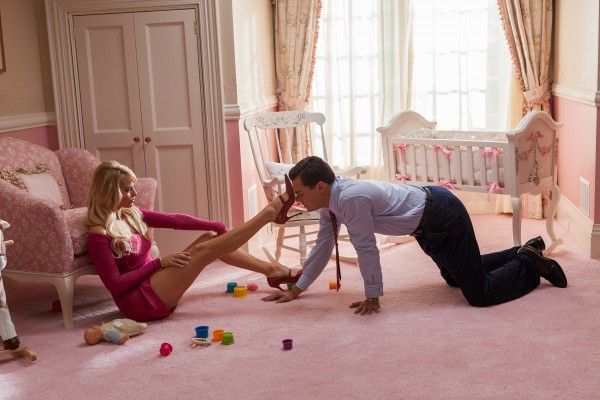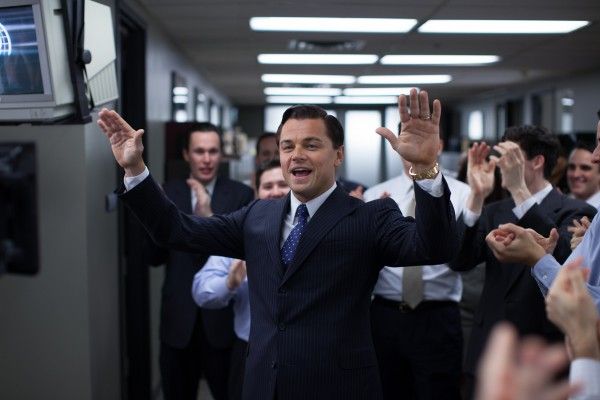Drawing a fully packed house, the 29th Santa Barbara International Film Festival (SBIFF) presented the prestigious Cinema Vanguard Award to legendary director Martin Scorsese and award-winning actor Leonardo DiCaprio, on behalf of their working relationship. Having collaborated together five times now, on Gangs of New York, The Aviator, The Departed, Shutter Island and The Wolf of Wall Street, the two have brought some intriguing stories to the big screen, with the promise of exciting things still to come. Collider was there to cover and attend the event, and we’ve compiled the highlights of what they had to say during the Q&A.While there, Martin Scorsese and Leonardo DiCaprio talked about how they first came to work with each other, the experience of making Gangs of New York, how The Aviator came about, playing a real-life person versus a fictional character, what led them to make The Departed, the experience of making Shutter Island, how they almost made The Wolf of Wall Street first, and what took that film so long to get made. Check out what they had to say after the jump.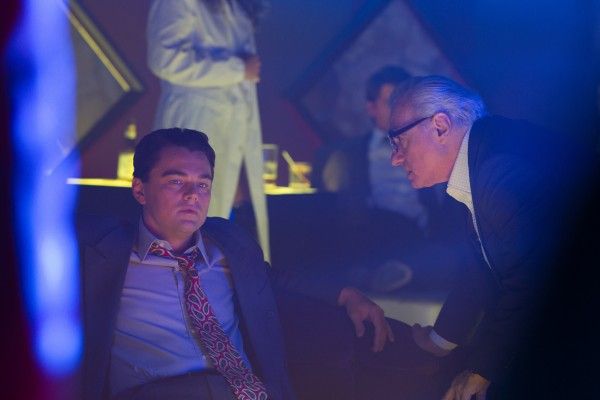 Question: Leo, this past year was a rather amazing year for you, having portrayed the two twin pillars of wealth in the 20th century, with Gatsby and with Jordan Belfort in The Wolf of Wall Street. How did it come about that you happened to choose those two wealthy characters, and how would you compare them and what wealth meant to them, in their era?LEONARDO DICAPRIO: The truth is that I’ve always been fascinated with wealth in America. To me, it’s been about the American dream and the corruption of that dream. Coming from where I was brought up, I went to a school in Beverly Hills and I always looked at the other side of the spectrum. It’s been a fascination of mine, for a long period of time. Certainly since 2008 and what happened with the economic downfall, [The Wolf of Wall Street] in particular, and this element of our very culture, was something that I wanted to put up on the screen. They have similar motivations. They both come from the underworld. They recreate themselves. But, putting this culture up on the screen is something I’ve been wanting to do, for a long time. Jordan is the antithesis of Gatsby. His motivations come from a reptilian part of his brain, whereas Gatsby is doing it all for love.  Those are two entirely different motivations. But since 2008, I felt we needed to explore the darker nature of humanity with these character who have complete disregard for anyone except themselves, and their own greed and lust for power. Marty, when did you first see Leo on screen?MARTIN SCORSESE: I think it was some scenes from This Boy’s Life, but it was after Robert DeNiro told me, “By the way, I’m working with this young kid. He’s really good. You should work with him sometime. His name is DiCaprio.â€Â And I said, “Okay.â€Â Especially at that time, in ‘93. The last collaboration I did with DeNiro was Casino, which was our eighth film. It’s been different since. We don’t see each other that often. So, for him to recommend somebody, out of the blue, that way to me, during a phone call, was very, very special. I hadn’t seen Gilbert Grape in the theater, but I happened to catch part of it on television, on one of the film channels. Myself and my wife were watching it, and I thought it was a documentary. I didn’t know. I didn’t recognize Johnny [Depp]. The mother was great. And I was amazed by [Leo]. And then, I realized that it was actually a staged film. I thought, “Who’s that boy?â€Â We saw the name, and it was the name that DeNiro told me about. And then, he made Titanic, which I had nothing to do with. Let’s get that clear. I get seasick. But at that point, it was a big crossroads in my career. I had made Kundun and Bringing Out the Dead, and both films didn’t do very well at the box office. Things were changing. So, Michael Ovitz came up to me and said, “Don’t you want to make Gangs of New York? I’m working with these guys and one of them is Leo DiCaprio, and he happens to like your films.â€Â That’s important. It’s great to have an actor who wants to work with you. So, we started that way. He came on the set of Bringing Out the Dead, and we talked about working together on Gangs.Â
Question: Leo, this past year was a rather amazing year for you, having portrayed the two twin pillars of wealth in the 20th century, with Gatsby and with Jordan Belfort in The Wolf of Wall Street. How did it come about that you happened to choose those two wealthy characters, and how would you compare them and what wealth meant to them, in their era?LEONARDO DICAPRIO: The truth is that I’ve always been fascinated with wealth in America. To me, it’s been about the American dream and the corruption of that dream. Coming from where I was brought up, I went to a school in Beverly Hills and I always looked at the other side of the spectrum. It’s been a fascination of mine, for a long period of time. Certainly since 2008 and what happened with the economic downfall, [The Wolf of Wall Street] in particular, and this element of our very culture, was something that I wanted to put up on the screen. They have similar motivations. They both come from the underworld. They recreate themselves. But, putting this culture up on the screen is something I’ve been wanting to do, for a long time. Jordan is the antithesis of Gatsby. His motivations come from a reptilian part of his brain, whereas Gatsby is doing it all for love.  Those are two entirely different motivations. But since 2008, I felt we needed to explore the darker nature of humanity with these character who have complete disregard for anyone except themselves, and their own greed and lust for power. Marty, when did you first see Leo on screen?MARTIN SCORSESE: I think it was some scenes from This Boy’s Life, but it was after Robert DeNiro told me, “By the way, I’m working with this young kid. He’s really good. You should work with him sometime. His name is DiCaprio.â€Â And I said, “Okay.â€Â Especially at that time, in ‘93. The last collaboration I did with DeNiro was Casino, which was our eighth film. It’s been different since. We don’t see each other that often. So, for him to recommend somebody, out of the blue, that way to me, during a phone call, was very, very special. I hadn’t seen Gilbert Grape in the theater, but I happened to catch part of it on television, on one of the film channels. Myself and my wife were watching it, and I thought it was a documentary. I didn’t know. I didn’t recognize Johnny [Depp]. The mother was great. And I was amazed by [Leo]. And then, I realized that it was actually a staged film. I thought, “Who’s that boy?â€Â We saw the name, and it was the name that DeNiro told me about. And then, he made Titanic, which I had nothing to do with. Let’s get that clear. I get seasick. But at that point, it was a big crossroads in my career. I had made Kundun and Bringing Out the Dead, and both films didn’t do very well at the box office. Things were changing. So, Michael Ovitz came up to me and said, “Don’t you want to make Gangs of New York? I’m working with these guys and one of them is Leo DiCaprio, and he happens to like your films.â€Â That’s important. It’s great to have an actor who wants to work with you. So, we started that way. He came on the set of Bringing Out the Dead, and we talked about working together on Gangs. 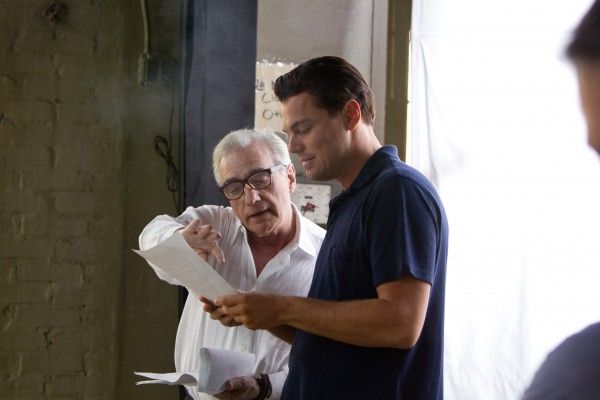 Leo, as you were growing up, when did you start paying attention to who directed films, and looking at films from that point of view?DICAPRIO: This Boy’s Life was a very coveted role, and a lot of my friends that I grew up with in the industry were all fighting for the role. So, I quickly gave myself a film education. I watched three or four films a day, for what seemed like a year. All of the actors of my generation were influenced by the films of the ‘70s, during the director’s era of filmmaking. And the films that really stood out the most for all of us were [Scorsese’s] films. I remember watching Taxi Driver, specifically, and having the protagonist fool me, in that way. I was so invested in his loneliness and had such empathy for that character, and then, all of a sudden, he was doing an assassination attempt. But more so than that, the areas that Marty was able to explore in his filmmaking, he made you feel so incredibly uncomfortable. He had a way of immersing you in his filmmaking that just really stood out to me, as a young actor. I remember saying to myself, “Someday I want to do something that good. I want to be able to be in one scene of his films.â€Â As soon as I had the opportunity to finance films with my name, this was the first real attempt I made to pro-actively go after a filmmaker and say, “Will you work with me?â€Â I researched Gangs of New York, which he had been writing, on and off, for 20 years, and I said, “Let’s do this.â€Â Marty, was the script for Gangs of New York that you wrote in 1976, basically what you made, 20 years later?SCORSESE: Elements of it. Jay Cocks had written the original script, with the entire first section and the battle in the streets and the setting up of Five Points and where I had set the end.  But, the character of Amsterdam changed a lot when we got Leo in. The character of Bill the Butcher was in the original, but that changed somewhat, too. All of it really had an extraordinarily complex evolution, as we were making the film, shooting it, rewriting and working on it there. Gangs of New York was the first time you worked together. Before you started shooting, did you have intensive discussions about the character, his look and the psychology, or did that happen once filming began? How do you go into a picture together, when you’re working together?
Leo, as you were growing up, when did you start paying attention to who directed films, and looking at films from that point of view?DICAPRIO: This Boy’s Life was a very coveted role, and a lot of my friends that I grew up with in the industry were all fighting for the role. So, I quickly gave myself a film education. I watched three or four films a day, for what seemed like a year. All of the actors of my generation were influenced by the films of the ‘70s, during the director’s era of filmmaking. And the films that really stood out the most for all of us were [Scorsese’s] films. I remember watching Taxi Driver, specifically, and having the protagonist fool me, in that way. I was so invested in his loneliness and had such empathy for that character, and then, all of a sudden, he was doing an assassination attempt. But more so than that, the areas that Marty was able to explore in his filmmaking, he made you feel so incredibly uncomfortable. He had a way of immersing you in his filmmaking that just really stood out to me, as a young actor. I remember saying to myself, “Someday I want to do something that good. I want to be able to be in one scene of his films.â€Â As soon as I had the opportunity to finance films with my name, this was the first real attempt I made to pro-actively go after a filmmaker and say, “Will you work with me?â€Â I researched Gangs of New York, which he had been writing, on and off, for 20 years, and I said, “Let’s do this.â€Â Marty, was the script for Gangs of New York that you wrote in 1976, basically what you made, 20 years later?SCORSESE: Elements of it. Jay Cocks had written the original script, with the entire first section and the battle in the streets and the setting up of Five Points and where I had set the end.  But, the character of Amsterdam changed a lot when we got Leo in. The character of Bill the Butcher was in the original, but that changed somewhat, too. All of it really had an extraordinarily complex evolution, as we were making the film, shooting it, rewriting and working on it there. Gangs of New York was the first time you worked together. Before you started shooting, did you have intensive discussions about the character, his look and the psychology, or did that happen once filming began? How do you go into a picture together, when you’re working together?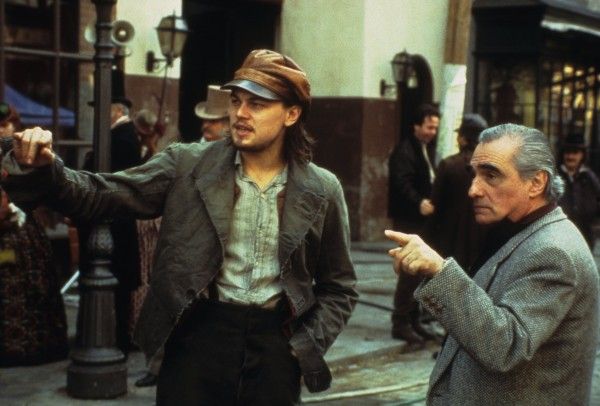 DICAPRIO: Honestly, I feel that every film has been different. For lack of a better word, it’s an energy thing. You feel that some things need to be discussed at length, and others can be a discovery process. This movie was much different than any other process that we’ve had. With some films, we talk about the character, the psychology of the character, the historical facts of that time and being relevant. And then, other films have had a looseness to them. SCORSESE: When Leo agreed to do Gangs, the script was still in flux. Both Jay and I were working on it, for many years. The character of Amsterdam had to be shaped to Leo. That’s something I did on Taxi Driver with DeNiro, on The Color of Money with Paul Newman, and on Alice Doesn’t Live Here Anymore with Ellen Burstyn. I seem to work better that way, when an actor really wants to do it, so that I can shape it around the actors natural behavior, to a certain extent, and utilize it. That’s the most important instrument in front of that lens. That was a constant evolution, as we worked on it. Day by day, it kept changing. We kept finding it, as we tried different things. It was an exciting time, but also difficult and crazy. It was 157 days of shooting, and we were shooting in Rome. DICAPRIO: It was an amazing set. They really recreated turn-of-the-century New York. If you walked through the backlot, there was an entire bay of New York in the 1860s. You got lost in it. It was a really incredibly difficult undertaking because the entire set was built, and we had to shoot a movie in it. SCORSESE: So, we were not really in Rome. We were in the Five Points, every day. DICAPRIO: And a lot of people were in character, constantly. Marty, Leo and Daniel Day-Lewis are two great actors with very different approaches. How did you deal with that?
DICAPRIO: Honestly, I feel that every film has been different. For lack of a better word, it’s an energy thing. You feel that some things need to be discussed at length, and others can be a discovery process. This movie was much different than any other process that we’ve had. With some films, we talk about the character, the psychology of the character, the historical facts of that time and being relevant. And then, other films have had a looseness to them. SCORSESE: When Leo agreed to do Gangs, the script was still in flux. Both Jay and I were working on it, for many years. The character of Amsterdam had to be shaped to Leo. That’s something I did on Taxi Driver with DeNiro, on The Color of Money with Paul Newman, and on Alice Doesn’t Live Here Anymore with Ellen Burstyn. I seem to work better that way, when an actor really wants to do it, so that I can shape it around the actors natural behavior, to a certain extent, and utilize it. That’s the most important instrument in front of that lens. That was a constant evolution, as we worked on it. Day by day, it kept changing. We kept finding it, as we tried different things. It was an exciting time, but also difficult and crazy. It was 157 days of shooting, and we were shooting in Rome. DICAPRIO: It was an amazing set. They really recreated turn-of-the-century New York. If you walked through the backlot, there was an entire bay of New York in the 1860s. You got lost in it. It was a really incredibly difficult undertaking because the entire set was built, and we had to shoot a movie in it. SCORSESE: So, we were not really in Rome. We were in the Five Points, every day. DICAPRIO: And a lot of people were in character, constantly. Marty, Leo and Daniel Day-Lewis are two great actors with very different approaches. How did you deal with that?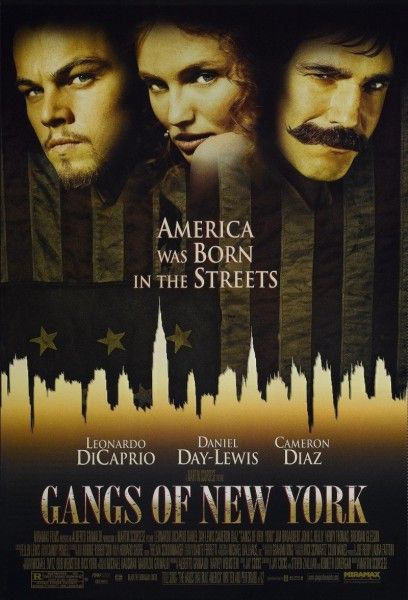 SCORSESE: You just do both. It takes time. DICAPRIO: I remember one of the first days, Daniel Day-Lewis and Marty were getting their feet wet in the whole process, and Daniel wanted to know how to cut the meat. They got a big piece of meat and they sat there, almost the whole nine hours, discussing how to cut the meat. SCORSESE: My brother used to work in a butcher shop. I used to sit and watch him gut the meat, back in the early ‘50s, in the lower East Side. The butcher was very, very important. The biggest issue was choosing the right knife. That was Bill’s knife, and nobody could touch it. He had a few. DICAPRIO: We had to get him out of retirement. He was a cobbler. Before that film, he was making shoes for six years, in Italy. He was unsure whether he was going to start acting again. So, I had a big conversation with him, about one of the greatest actors of our time, if not ever, getting back into the industry. It was a pretty interesting conversation. Leo, as an actor, do you prefer doing more takes per scene, or do you like to shoot quickly?DICAPRIO: I do prefer doing more takes. There’s something very organic that comes from the first take, but certain things come out. More details come out, in the way another actor says something. It’s always this investigative process. You come further and further to the truth, the more you escalate. Maybe it peaks around the 5th or 6th take. You get into a groove, and then you can become automatic again and start to do a routine. And then, sometime around the 12th or 13th take, you can come back to something more organic again. But, I like to do a lot of takes. I have a hunger for it. I like to see what there is to discover in a scene, that hasn’t been thought of. SCORSESE: We just try to stay in touch with that, every day. How did The Aviator come about?DICAPRIO: Basically, we did Gangs of New York and had a really great working relationship there. I had picked up a book, when I was 21, about Howard Hughes, and I really became obsessed with playing him. He was the most fascinating character I had come across, in a long time. I had actually developed a script with Michael Mann for awhile, and then he went off to do Ali. So, I was sitting there with this screenplay, and I remember sending it over to Marty, in the hopes that he’d be interested in it. The first thing he said was that he didn’t know anything about aviation, but that he didn’t know anything about boxing either, and he did Raging Bull. So, that was encouraging. That, to me, is one of the most nostalgic memories I have, of really making a movie. For the first time, I had that responsibility of bringing material like this to a director of [Marty’s] stature. And then, we created it and did a makeshift Hollywood in Montreal. We did an investigation into who this character was, and this fascinating look into his mind through this screening room and the confinement of that. It was really a miraculous part of my life. I had never submerged myself and really focused on absolutely nothing but that film, for eight or nine months of my life. I was so dedicated to that process. I felt a real responsibility for a movie, for the first time. When you grow up in the industry, the director is your father. You follow your father’s lead, but you make your own way. This was the first time I was like, “Here, dad, do you like it?â€Â
SCORSESE: You just do both. It takes time. DICAPRIO: I remember one of the first days, Daniel Day-Lewis and Marty were getting their feet wet in the whole process, and Daniel wanted to know how to cut the meat. They got a big piece of meat and they sat there, almost the whole nine hours, discussing how to cut the meat. SCORSESE: My brother used to work in a butcher shop. I used to sit and watch him gut the meat, back in the early ‘50s, in the lower East Side. The butcher was very, very important. The biggest issue was choosing the right knife. That was Bill’s knife, and nobody could touch it. He had a few. DICAPRIO: We had to get him out of retirement. He was a cobbler. Before that film, he was making shoes for six years, in Italy. He was unsure whether he was going to start acting again. So, I had a big conversation with him, about one of the greatest actors of our time, if not ever, getting back into the industry. It was a pretty interesting conversation. Leo, as an actor, do you prefer doing more takes per scene, or do you like to shoot quickly?DICAPRIO: I do prefer doing more takes. There’s something very organic that comes from the first take, but certain things come out. More details come out, in the way another actor says something. It’s always this investigative process. You come further and further to the truth, the more you escalate. Maybe it peaks around the 5th or 6th take. You get into a groove, and then you can become automatic again and start to do a routine. And then, sometime around the 12th or 13th take, you can come back to something more organic again. But, I like to do a lot of takes. I have a hunger for it. I like to see what there is to discover in a scene, that hasn’t been thought of. SCORSESE: We just try to stay in touch with that, every day. How did The Aviator come about?DICAPRIO: Basically, we did Gangs of New York and had a really great working relationship there. I had picked up a book, when I was 21, about Howard Hughes, and I really became obsessed with playing him. He was the most fascinating character I had come across, in a long time. I had actually developed a script with Michael Mann for awhile, and then he went off to do Ali. So, I was sitting there with this screenplay, and I remember sending it over to Marty, in the hopes that he’d be interested in it. The first thing he said was that he didn’t know anything about aviation, but that he didn’t know anything about boxing either, and he did Raging Bull. So, that was encouraging. That, to me, is one of the most nostalgic memories I have, of really making a movie. For the first time, I had that responsibility of bringing material like this to a director of [Marty’s] stature. And then, we created it and did a makeshift Hollywood in Montreal. We did an investigation into who this character was, and this fascinating look into his mind through this screening room and the confinement of that. It was really a miraculous part of my life. I had never submerged myself and really focused on absolutely nothing but that film, for eight or nine months of my life. I was so dedicated to that process. I felt a real responsibility for a movie, for the first time. When you grow up in the industry, the director is your father. You follow your father’s lead, but you make your own way. This was the first time I was like, “Here, dad, do you like it?â€Â 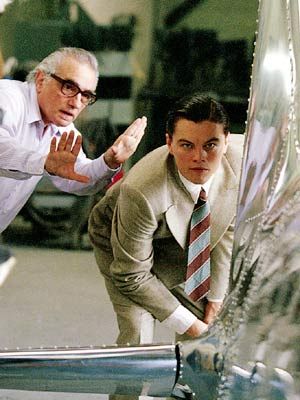 Leo, how different is your approach when you’re playing a real-life person and you have to live up to certain expectations, as opposed to playing a completely fictional character?DICAPRIO: Basically, the main difference when you’re playing somebody that’s known throughout history is that you get to look at these great catalogues of their life. When you’re playing somebody who hasn’t lived throughout history, you have to make all of that shit up yourself. In a lot of ways, it’s a lot more work. But, they’re both fascinating and different, in their own respects. I get very nostalgic for history. With Howard Hughes, the idea of this billionaire that was simultaneously deathly afraid of microscopic germs, and who confined himself into a screening room and couldn’t communicate with the outside world, and yet had this immense empire and was influential and powerful, especially in the world of aviation, was fascinating to me. It was really almost like being a journalist. I went back and meant with Jane Russell and Terry Moore, and did an account of everyone I knew that had ever met him. I did a road trip, of sorts. I lived with somebody with OCD. I met the doctor who is a professor on the subject matter. When you create a character on your own, you have to make up that history. I prefer playing people who have actually existed, or who have some grain of truth to them, because it gives you a lot more research to do. Oftentimes, history is just so much more fascinating than the shit you can make up in your own mind. SCORSESE: This guy was an incredible genius and a brave man. He flew in a little tin tube with heavy turbulence and crash-landed. I had always shied away from the Howard Hughes story. I knew that Steven Spielberg had wanted to make it for many years, and Warren Beatty. With this particular story, I didn’t know what it was, when they gave me the script. As I was reading it, I realized it was Howard Hughes, but it was one I didn’t really know much about. But, he was like an ancient Greek king, in a way, or an old myth. He was like Icarus. Leo, when you get so immersed in a role, does it affect you personally, at least temporarily?
Leo, how different is your approach when you’re playing a real-life person and you have to live up to certain expectations, as opposed to playing a completely fictional character?DICAPRIO: Basically, the main difference when you’re playing somebody that’s known throughout history is that you get to look at these great catalogues of their life. When you’re playing somebody who hasn’t lived throughout history, you have to make all of that shit up yourself. In a lot of ways, it’s a lot more work. But, they’re both fascinating and different, in their own respects. I get very nostalgic for history. With Howard Hughes, the idea of this billionaire that was simultaneously deathly afraid of microscopic germs, and who confined himself into a screening room and couldn’t communicate with the outside world, and yet had this immense empire and was influential and powerful, especially in the world of aviation, was fascinating to me. It was really almost like being a journalist. I went back and meant with Jane Russell and Terry Moore, and did an account of everyone I knew that had ever met him. I did a road trip, of sorts. I lived with somebody with OCD. I met the doctor who is a professor on the subject matter. When you create a character on your own, you have to make up that history. I prefer playing people who have actually existed, or who have some grain of truth to them, because it gives you a lot more research to do. Oftentimes, history is just so much more fascinating than the shit you can make up in your own mind. SCORSESE: This guy was an incredible genius and a brave man. He flew in a little tin tube with heavy turbulence and crash-landed. I had always shied away from the Howard Hughes story. I knew that Steven Spielberg had wanted to make it for many years, and Warren Beatty. With this particular story, I didn’t know what it was, when they gave me the script. As I was reading it, I realized it was Howard Hughes, but it was one I didn’t really know much about. But, he was like an ancient Greek king, in a way, or an old myth. He was like Icarus. Leo, when you get so immersed in a role, does it affect you personally, at least temporarily?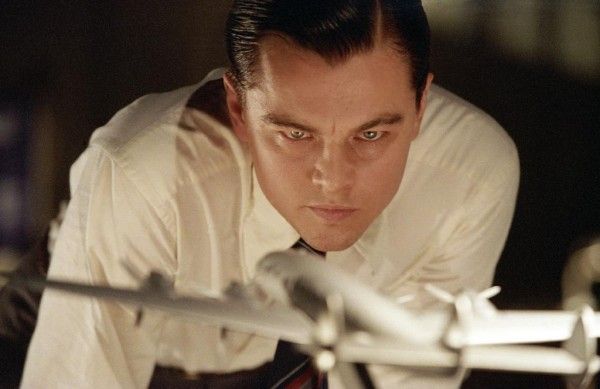 DICAPRIO: Yeah, it does. The truth is, you shut down the rest of your life. Everything goes on hold. I locked myself in my hotel room, for the entirety of that shoot. What we’re ultimately talking about here is the collaboration between the actor and the director. While I’m singularly focused on my role and so concentrated on doing what I’m doing, while I’m there, it’s so amazing to have somebody that’s simultaneously doing something like using four different technicolor prints that change with the ‘20s, ‘30s and ‘40s. All these little intricate details are going on, while I’m just being narcissistic and thinking about my character. It’s amazing. It’s beyond words. He’s in his own little labyrinth, simultaneously. SCORSESE: It was a role that fit him. He is the picture. As long as he’s there, and I know he’s going to be there, then it’s okay. I had no doubts he would be there, every time I needed Howard. DICAPRIO: I would come to [Marty] with an intricate list of all of Howard’s eccentricities, like how he would eat his peas, what he would and wouldn’t do, how he’d use a napkin. How he translated that cinematically was amazing. I would say, “This is what I know I need to do for my OCD. This is the way it works, otherwise it equals death for him.â€Â And then, he would shoot it.Â
DICAPRIO: Yeah, it does. The truth is, you shut down the rest of your life. Everything goes on hold. I locked myself in my hotel room, for the entirety of that shoot. What we’re ultimately talking about here is the collaboration between the actor and the director. While I’m singularly focused on my role and so concentrated on doing what I’m doing, while I’m there, it’s so amazing to have somebody that’s simultaneously doing something like using four different technicolor prints that change with the ‘20s, ‘30s and ‘40s. All these little intricate details are going on, while I’m just being narcissistic and thinking about my character. It’s amazing. It’s beyond words. He’s in his own little labyrinth, simultaneously. SCORSESE: It was a role that fit him. He is the picture. As long as he’s there, and I know he’s going to be there, then it’s okay. I had no doubts he would be there, every time I needed Howard. DICAPRIO: I would come to [Marty] with an intricate list of all of Howard’s eccentricities, like how he would eat his peas, what he would and wouldn’t do, how he’d use a napkin. How he translated that cinematically was amazing. I would say, “This is what I know I need to do for my OCD. This is the way it works, otherwise it equals death for him.â€Â And then, he would shoot it.Â
Martin Scorsese and Leonardo DiCaprio Interview
Continued on Page 2
How did The Departed come about?
SCORSESE: There was a stack of scripts. The Aviator did very well, and we were looking for a third film, but we didn’t know what the hell it was. What I wanted to do was a down and dirty B film. The Aviator was a spectacle, in a good way. I’m terrified of flying, so I wanted to get in there and throw myself into it. Maybe that fear and that energy propelled a lot of that aura and inspired a lot of the montage of the picture, the textures of the plane, the sexuality of it, and the mental illness. Having done that, I said, “Okay, I just want to free myself and do a picture that’s just a street war.â€Â I didn’t know that until I read the script that Bill Monahan wrote for The Departed. I was somewhat familiar with Infernal Affairs from Hong Kong cinema, but the police are different, in different parts of the world. They’re not necessarily very different, but it’s a different society with the Boston police and the New York police. I just liked the sense of the script. And then, Leo jumped in.
DICAPRIO:Â I think it was sent to both of us, at the same time.Â
SCORSESE: There were a couple of other scripts, too. There was one about the actual attack of the real whale that attacked the real whaling ship that Moby Dick was based on. But, I realized that I’d never get out of that picture, with the boats. Forget it! But, we could shoot this one quickly in Boston and make something really strong. It was a film that didn’t give a damn about anything. It just started right off with the street violence. It just all started to develop from there.
Leo, what was it like to work with Jack Nicholson?
DICAPRIO: There’s a confrontation that we have, where he’s basically sussing out whether I’m the rat that I am. There’s a bar scene that we had. And I remember that we spent a day doing the scene and it went okay.Â
SCORSESE: Yeah, it was good. We shot it with double cameras, and it was seated. It was all about the tension between the two of them. It went very well.Â
DICAPRIO: But then, Jack came up to Marty after the scene and said, “Look, I don’t know if I feel it.â€Â And Marty was like, “I don’t know if I feel it either.â€Â Jack said, “I don’t think he’s scared enough of me. Maybe that’s it. I think we need to do this again tomorrow, and I think I need to be more scary.â€Â So, all I knew was that, on the call sheet the next day, we were going to do the scene again and get another crack at it. The prop guy, on the way to set, said, “I just want to let you know something for safety purposes that Mr. Nicholson has a bottle of Whiskey, some matches and a gun. I just have to tell you that.â€Â I came in and he was fidgeting with himself, and he had this diagram of all these rats rushing towards the White House. I just sat down. What he wanted to have happen was to pour the Whiskey on the picture of the White House, light it and have the whole table go up in flames, and then there would be a fire in between us. It turned out to be Diet Coke instead of Whiskey because they couldn’t use Whiskey, so [it didn’t light on fire]. But, the energy of what he brought to it created a pretty cool dynamic between the two of us. I remember him actually reaching for the gun and he forgot where it was, and it fell. And then, I was like, “What the hell does he have under there?,†and he looks at it. But, it was great. That’s the great thing about that whole process. [Marty is] willing to give it another shot. He’s willing to wait for the actors, through their characterization, to ultimately tell what the story is. He always sees that as paramount.Â
SCORSESE: That’s why that particular scene is my favorite scene. It was well written. Bill Monahan’s script was very, very good. But with what was going on with the picture, up until that point, I felt that we could have gotten more, I just didn’t know what. So, after the four takes we did that night, Jack and I looked at each other and I said, “It’s very good, but it needs something.â€Â That’s when he said to me, “I think he’s not scared enough.â€Â So, I said, “We have another half-day on the schedule for this. Why don’t we do it again tomorrow and just see what happens?â€Â He said, “What do you want to do?â€Â I said, “Think of anything you’d like, and we’ll see what we come up with.â€Â So, the next day, we were shooting and suddenly he comes up to me and says, “I’ve got ideas!â€Â I said, “Good. Let’s go!â€Â And I didn’t know that he wanted to burn the table. I didn’t know he had a gun. I said, “Let’s roll!â€Â He was looking at Leo and saying, “Are you the rat?!â€Â I just felt it was so important that Leo convince him that he is not the rat because he is the rat. He’s in that bar. They locked the door. That’s it. He’s dead. Everything can turn, if I don’t believe him. And he’ll make it such that he convinces him because he’ll keep going. I didn’t know about the Whiskey thing, or I would have put real Whiskey in there, but the fire would have been too much. The gun was enough.Â
Was The Departed fun to make?
DICAPRIO: Yeah. It was a little more stressful than most pictures, truthfully. Everyone was going off to do other movies.Â
SCORSESE:Â We were like chopped liver!
DICAPRIO: There were three commitments for other films, and I was there for the entirety of it. We had to work with some doubles at certain times, so it got a little bit frustrating. But being in Boston like that, the culture was percolating everywhere. Everyone that you talked to knew everything about the streets, the history and everything that went on in the underworld. We fed off that. It was great!
SCORSESE: It’s a true story, in a sense. The guy was FBI and he’s in jail now. He did turn. There are these moral issues that get clouded over. It’s wild.
Shutter Island was more of a genre film. How did you decide on that movie?
DICAPRIO: We were going to do Wolf, but that fell apart. And then, this script came along. We have similar tastes, and it just happened that way. It was a very difficult and interesting film to take on. It was especially difficult for me because I had multiple personalities. At the same time, if I gave that away at any point during the narrative, the entire plot structure would cave in. So, it was walking this tightrope with being able to do something that was audacious in a scene and could, on the second or third go-around, be looked at as clinically insane, but in context, you would think that he is just passionate and logical about cracking this case. It was a real tightrope for me, as an actor. It was basically me going a little bit overboard, and Marty going, “Less, kid.â€Â It was a constant process of that. It was very challenging, and it was also very challenging to be outdoors in these windstorms.Â
SCORSESE: What happens is what they call the director’s disease. My A.D. said, “There’s a storm. Half of the script will be in a storm.â€Â I said, “Come on, it’s a few days of water.â€Â It was a big miscalculation, in terms of that. You think it’s going to be not easy, but that you can get going. If you ever really thought about it, you wouldn’t do it. You think about getting it finished and creating something, but the minute you start to get into it, you realize that there’s no way out. It was the same way with the character. We realized in rehearsal that we were screwed. It was three, four or five levels, in every take.Â
What was Shutter Island like, as a script?
SCORSESE: How does one do a dream? Usually, an actor wants to know where they came from. They go, “I just came in from the street. I went up the stairs. I opened the door, and there you were.â€Â So, where does the ghost come from? Where has she been? It’s very difficult for actors to stay in a dream state. So, what [Leo] did there is so beautiful. It’s still very moving to me, and I designed the shots. It’s always a problem, doing a dream scene.
So, The Wolf of Wall Street was developing through that period. Was that something you wanted to do, for a long time?
DICAPRIO: Yeah, it was right around the same time, we had gotten the opportunity to do Wolf, but I feel like Marty really wanted to make it an American epic. If we’re going to do a film that is putting this very dark part of our culture up on screen, that is also a very comedic one, at the same time, with these characters that are essentially incredibly narcissistic and have no moral compass, we wanted to push the envelope with it. We wanted to be able to portray their lives in an authentic way. And I think he got a little resistance from the studio, initially, so he backed off saying, “Look, if we’re going to do this film, we’ve got to do it the way it should be done.â€Â And we kind of agreed, and the whole thing went on ice for awhile. So, we ended up doing Shutter Island. I had a couple opportunities to do it with other directors, and got down the road with them, and right when it came down to committing, I just couldn’t do it. I really had to have him do it. We knew we weren’t taken on precious American literature. We knew we weren’t taking on The Great Gatsby. We were trying to put this culture up on the screen. And there’s nobody that I knew that would give the actors enough time, through their characterization of these people, to ultimately tell the story. That’s what The Wolf of Wall Street needed. It needed someone that took the time to allow the actors to breathe, to experiment and to improvise, and come up with these moments that are the fabric of the story. I needed that for this movie.
SCORSESE:  The Departed worked out very well, for all of us, but it was a struggle. There was a lot of concern from the studio and the studio system, for each word, the sexuality of it, the violence, the racism, and all of those sort of things, and I just didn’t know if I could do it again, or if I would have the energy to go through it again. So ultimately, [Leo] pulled it together, over these last few years. He was able to get Joey McFarland and Riza [Aziz] at Red Granite to be able to finance the picture with total freedom. We went overboard, in the sense of the excess of what they’re doing with the language and the sex, and all that. We had to have the trust to be able to shape it. We had to have that freedom. It couldn’t be done with a studio. That would have been too much for me.
With most directors who have been making films for 40 years, their films get a little slower and a little more stately, as they get older. The Wolf of Wall Street has more energy than any film you’ve ever made. What was that like to do?
SCORSESE: That’s one of the reasons that I didn’t want to do it. It’s hard to get through the day. But Leo, Jonah [Hill] and Margot [Robbie] would give me this extraordinary excitement, and we’d just go. We shot in 87 days. I knew that not only did I have to be there, but after it was finished, I had to live with it for another 10 or 11 months. That’s when you really kick in, in the editing room. I can’t saying, “Ferocious, goddamn it! Ferocious! Kick its ass! Let’s go! Really, go at this scene. Come on, rip it down!â€
Leo, did you have to do multiple takes for the big speeches?
DICAPRIO: That was a very interesting. I’d been thinking about these speeches for like six years. To me, they were like Braveheart speeches, but they’re war cries for greed and debauchery, and persuading his co-workers to go screw over as many people over as possible. I had been thinking very meticulously about how to do them, and I had planned out each line. We had a re-writing process, and I honed it down. Even though I knew that every single person there was paid to applaud and cheer me, you felt like you were, Bono. You felt like you were a bona fide rock star. That was a very compelling, interesting moment. I felt closer to what he must have felt like – somebody that had crossed that line of being honest with himself, as far as what he was doing, breaking the law and slowly crossing the line, more and more, and then persuading a gigantic group of people and, in a sense, creating a cult for himself and having to uphold that cult with a surge of energy of lies. I felt very close to Jordan, at that moment, and how he must have gotten lost, completely, with the audience there. There was something about the audience.
SCORSESE: We kept the speeches to the end of the shoot for Leo. The first one – the Steve Madden one – he came in and I saw right away that he was moving differently. His tonsils were infected.
DICAPRIO: Oh, yeah, that was miserable. I had traveled to Australia for New Years, and then I went back to set and was ready to do the speeches, and my throat just seized up with Tonsillitis.
SCORSESE: So, I said, “Just go home.â€Â And I shot other stuff for a day and a half. And then, we shot the Steve Madden scene on a Sunday because we were running out of time. We had to pull it together. And that was the day that Steve Spielberg decided to come and visit. He was coming for an hour, but he hung out the whole day.
DICAPRIO:Â The actors were not only intimidated to have Marty on the other end of the monitor watching them, but then to have Spielberg and Marty, both sitting there, talking about the scene and watching the actors, everyone was shitting in their pants.
SCORSESE: He was laughing. We had a good time.

